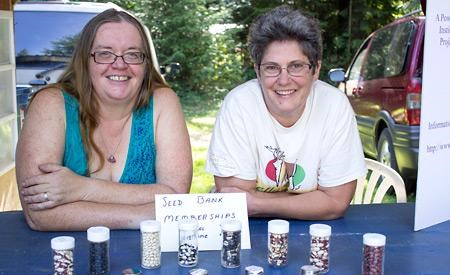Food security starts with seed security and a group of Powell River farmers is working to create a depository of locally-adapted seeds.
Powell River Farmers’ Institute (PRFI) is developing its seed bank and is looking for interested gardeners and farmers to participate. The institute has been organizing its Seedy Saturday seed swap for many years, but this bank will make local seeds available throughout the year.
The idea for creating a seed bank or library in Powell River has been in the works for a number of years, but has been helped along recently with a grant from The Bauta Family Initiative for Canadian Seed Security’s Public Access and Regional Seed Diversification Fund. Bauta is working to create a national movement to conserve and advance seed biodiversity, keep seed in the public domain and promote ecological seed production.
According to information from Bauta, organics is the fastest growing agri-food sector in Canada today. Yet, organic farmers rely primarily on seeds bred for uniformity, performance under controlled conditions with routine application of fertilizers.
A goal of the institute is to make the region sustainable with its own seed, instead of relying on seed that is not acclimatized to growing in this particular region. To do that it will need to be able to provide several hundred different varieties of heritage seed. Right now the bank has very few seeds in it, but with secure contributions from experienced gardeners the organizers hope to see the bank grow.
Organizers Ellen de Casmaker and Cynthia Demeester are looking for a location to house the seed bank and hope to find its permanent home this fall. It is currently located in a refrigerator at de Casmaker’s Eternal Seeds but she said the hope is to have it housed in a location open to the wider community. “This is Powell River and District’s seed bank,” she said.
“A seed bank has to be a living thing,” she added. The bank is not simply a collection of seeds to store their genetic material, but an ongoing relationship between growers who learn how to grow the seeds in a controlled way to protect them from cross-pollination and ensure their genetic integrity. “This will be a continuous project from farmers and individual growers.”
Members of the seed bank are given seeds to grow from the bank that are known to be self-pollinated, pure and non-GMO, then at the end of the growing season that grower brings back a proportion of the seed from the produce they have grown, said Demeester.
“We’ll teach you how to grow them in a controlled manner to protect them from being pollinated from something else,” she said.
Powell River, with its isolation and its insulation from pollen drift, makes it an ideal location for creating a community non-GMO seed bank, said de Casmaker, adding that there are very few places in Canada that enjoy this situation.
A seed harvesting and cleaning workshop is being organized at 1 pm on Sunday, September 28, at 2309 Zilinsky Road. There will be experienced seed savers on hand to talk about collecting, demonstrate technique and discuss storage. Memberships to the seed bank will be available. Attendance is by donation.
For more information readers can visit the seed bank online at its Facebook page, visit its website or email [email protected].



